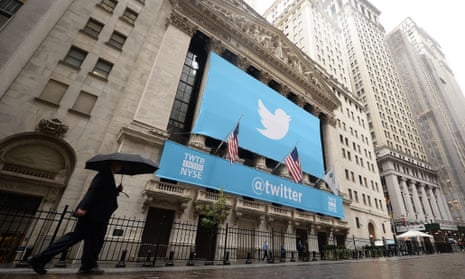It’s a way of life, an addiction, a mental torture tool for sexist trolls, a news source for journalists, a marketing tool for celebs and a communications medium used by 304 million people every month. But Twitter faces an uncertain future. Its user growth is slowing, its net losses totalled $0.5bn last year – on a turnover of $1.4bn – and it’s in its fifth month without a permanent chief executive.
With its shares now trading below the price they fetched when it floated on the stock exchange, Twitter is seen by some analysts as a likely target for takeover – either by Google or Facebook. Silicon valley analyst Victor Basta last week slammed Twitter’s failure to emulate Facebook, by adding lucrative extra features to its original design, describing Twitter as: “still essentially an overwhelming firehose of crowdsourced data.”
To which I say: good. Twitter’s problem is that, as a “solution”, it already works. It is, to use the two words hallowed in engineering, “good enough”. It conforms – with some qualifications – to criteria long-ago outlined by software veteran James Bach: it has sufficient benefits; no critical problems; the benefits outweigh the problems; and further improvement would cause more harm than good.
The longer Twitter has existed, the more this essential fact has become clear. It will grow, but not spectacularly; make profits, but not spectacular ones. And it works because – for all the trolls, threats and libels – there are self-correction mechanisms: the wisdom of crowds, the ability to block, and the company’s own tortuous, takedown mechanisms against abusers.
But to tech investors this is a bad thing. It means share prices calibrated for exponential growth cannot be justified. Any company that cannot demonstrate a clear route to monopolising its space, monetising its users’ data on a vast scale, is to be discarded, targeted for acquisition, consigned to perpetual dowdiness.
Nothing better illustrates our addiction to illogic than the mismatch between Twitter’s workability and its unpopularity with investors. And it’s a question with systemic importance.
When I’ve pointed to Wikipedia, Apache or Linux as harbingers of a new, non-market, open source economics, one of the stock responses is: “now show us something more spectacular.” The problem is, these modest, functional and free products are already in their own way spectacular. Wikipedia is the biggest information product in the world; Apache runs half the world’s web servers; and Linux is the system of choice for at least a third of all servers (the computers that run businesses) and 97% of the world’s supercomputers.
Subconsciously, what people are asking for is “bells and whistles”, exponential growth, market domination, or some revolutionary new interface that demonstrates revolutionary change. This is because, in the first 20 years of the tech revolution, we’ve seen truly exponential change. The price of the basic physical machines at the core of the digital economy – switches printed on to silicon, a chunk of hard drive storage or a megabit of wireless bandwidth – have all, as the consultancy Deloitte has shown, collapsed over the period of 20 years.
Deloitte believes that, unlike all previous tech revolutions, this exponential takeoff in tech productivity won’t stop, but will simply spill over into new, more innovative industries. Artificial intelligence, DNA synthesis, 3D printing, quantum computing and robotics are all, says Deloitte, exhibiting this upward rush: explosive change that never stops, or stabilises, but explodes for the forseeable future.
What Twitter’s predicament represents is that human beings do stop. They do reach – collectively as well as individually – a state where tools, products or services are “good enough”.
The investment guys think Twitter will now be absorbed as a good enough tool into a bigger company that will – in other spheres – go on innovating. Facebook and Google are the obvious partners as they can afford the price and bolt Twitter on to their existing services, mining the user-data for extra value.
But what if Google and Facebook themselves face, at some point, the same “problem” as Twitter? What happens when they reach a state where their benefits outweigh their problems and where further improvement makes no sense?
It was in the shadow of this question that they hived Google’s core search engine and advertising business off into a separate company this month, moving the experimental businesses developed on the sidelines into a separate holding company called Alphabet.
Speaking personally, I already have enough friends on Facebook. With no fewer than four messaging apps on my phone I have enough messaging to run several parallel lives.
What the tech revolution has taught us to ignore is that the word solution actually means something. Wikipedia is a solution to the need for a collaborative online encyclopedia; Twitter the solution to the need for a crowdsourced microblog that squirts – barely contolled – into our mindspace. This is not new in capitalism. The factory was such a brilliant solution to manufacturing workflow that, no matter what the product, by the early 20th century it was a no-brainer to build a six-storey brick and steel box and install a card system for “clocking in” to it.
Likewise the corner shop is a solution that – albeit with some difficulty – has survived suburbanisation, e-commerce and the move of supermarkets into local store provision. When Tesco will sell a 16-year-old kid cigarettes, at 2am, having just provided informal credit to a young mum whose gas card has run out, maybe the corner shop will die. But not yet.
Solutions die when the world around them changes quickly enough. But the history of all previous industrial revolutions should tell us to expect them to appear, and to last, once certain core technologies become stable. As a journalist required to inhabit this cascading world of gruesome pictures, threats, jokes and gender warfare, I would find it very hard to imagine a world without Twitter now. But I can easily imagine it as a public utility. The problem is, Wall Street can’t.
Paul Mason is economics editor of Channel 4 News. @paulmasonnews

